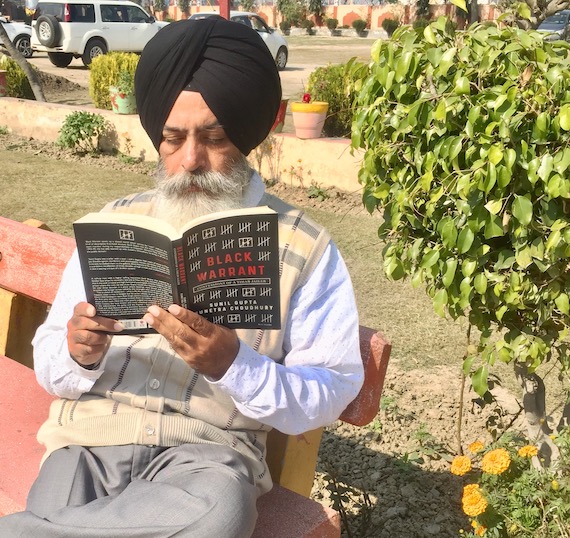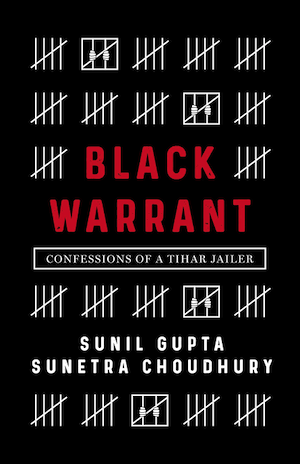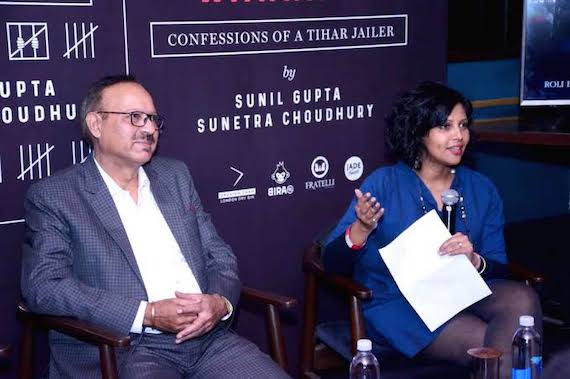Articles/Opinion » Sikh News
Maqbool Bhat’s Last Will Still Lying With Indian Authorities, Hidden From Family and Kashmiris
February 12, 2020 | By Sikh Siyasat Bureau
A picture of serenity, Maqbool Bhat read his last Namaz, drank tea and peacefully went to the gallows, 36 years ago. With the Quran as his constant companion, his regular readings of Islam made him a man of God for the inmates of Delhi’s Tihar Jail No 3. , recalls Tihar prison jailer Sunil Gupta in his memoirs – Black Warrant, reviewed here by Dal khalsa Activist Kanwar Pal Singh.

Kanwar Pal Singh
IN THE EARLY MORNING HOURS OF 11 FEBRUARY 1984, Maqbool Bhat was hanged in Tihar prison in the presence of a sub-divisional magistrate without allowing him a meeting with his lawyer and his family. His black warrant was obtained in a hurry with a case still pending in the Delhi High Court and he was buried in Tihar Jail No. 3.
Muslim inmates of the prison prepared his grave with the last prayers and rites carried out in Islamic tradition by a Muslim clergy from a Masjid nearby to the jail.
India was in a grand hurry to hang him soon after the killing of Indian envoy to the UK – Ravindra Mahatre. All mercy petitions, review petitions were dealt within just three days. Sunil Gupta believes that Maqbool was hanged almost overnight for something he was only remotely linked to.
Maqbool was arrested and sentenced to death for killing a CID officer in Jammu and Kashmir while trying to cross over to Pakistan.
Two years later, he and another inmate dug a 38-foot tunnel and escaped to Pakistan administered Kashmir.

Title of Black Warrant Book
Furthermore, he was arrested in connection with the hijacking case of IA flight to Lahore in 1971. Maqbool served three years imprisonment in Pakistan too along with hijackers Hashim and Ashraf Qureshi. Upon release, he returned to India in 1980 after unsuccessfully trying his hand in Pakistani politics.
On return, he was captured and the Supreme Court upheld his decade-old death sentence.
“The prison record of Maqbool Bhat was as spotless and pure as the spotless, pristine and sparkling white kurta-pyjama that he wore.”
Gupta describes that on 6 February 1984, hours after the Indian government learnt about Mahatre’s bullet-ridden body, the cabinet committee under Mrs Indira Gandhi decided to hang Bhat immediately, who was on death row since early 70’s. The Director-General Prisons was sent to Srinagar to get Bhat’s black warrant. It was as apparent as daylight that the state was acting in revenge.
Gupta has penned down accounts of eight death sentences in Delhi’s Tihar Jail during his tenure, of which I am sharing the final hours of Maqbool Bhat.
Throwing out all provisions of the Jail Manual, his brother and even his lawyer were not allowed to meet him one last time. His brother was arrested at Srinagar airport while he was on his way to Delhi to see him. His lawyer, also a Kashmiri -R. M. Tufail came to see his client but was denied permission.
On page 79 of the book, Gupta records the travesty of justice in the case. The gross lapse by India to hang someone without exhausting all judicial avenues.
Gupta writes, “the absurdity and tragedy of the way Bhat was hanged, can be seen by the following incident. Justice Anand’s court had scheduled a hearing of Maqbool’s case a few days later (after the hanging) where the Court was officially informed that the 45-year old petitioner has been hanged just a week before his birthday. The Delhi High Court judge sent a notice to the government asking why had he been hanged when his case was still under review in court. The jail authorities informed the honourable judge that the orders to hang him came from the competent authority. And there ended the judicial fight against Maqbool’s hanging”.
If this is described as a judicial murder by Bhat’s lawyers and human rights defenders, what is wrong with that?
Gupta opines that Maqbool Bhat was a political prisoner and he was also treated as one.
The former law officer of Tihar prison remembers Maqbool Bhat not as a founder of the Jammu and Kashmir Liberation Front -JKLF or as a separatist but as a highly educated, pious inmate, who was passionate about the freedom of Kashmir.
The jailer says loud and clear, “Bhat was a victim of circumstances. He believed that had the Indian diplomat Ravindra Mahatre not been kidnapped and murdered in Birmingham, Bhat would have survived the gallows. India failed to take into account that The Kashmir Liberation Front which kidnapped and killed the Indian diplomat had nothing to do with Bhat’s JKLF, except that they had demanded the release of Bhat.
The author of the book, who developed a personal rapport with Bhat says that the Quran was his constant companion and he would do regular readings, taking on the halo of being a man of God for the people in Tihar, rather than being seen as a terrorist. The jailer has showered full praise for his inmate and admitted that as an educated prisoner Bhat was useful to them in drafting memos, charge-sheets and other documents.
So much so, that Gupta, in all honesty, says that he improved his English language drafting skills due to his interactions with Maqbool Bhat.

Sunil Gupta former Jailer of Tihar Jail [File Photo]
Like some other known prisoners of Tihar who petitioned courts and jail authorities through Public Interest litigations to bring respite to prisoners of Tihar, Bhat also contributed a lot in changing the lives of inmates. He petitioned authorities about stocking religious books in jail and was successful in this aspect. Bhat fought against the provisions of the Prison Manual which described stationary as contraband and won the right for prisoners to keep stationery.
As a last wish, Maqbool Bhat was allowed to leave a will. A Sikh magistrate was called a day before the hanging. Bhatt got his will recorded in English. He exerted, “There will be many Maqbool Bhats that will come and go, but the freedom struggle in Kashmir should continue”.
Sunil Gupta has admitted that the prison authorities, acting on their own “realized the sensitivity and the potential inflammatory consequences that such a message would have and so we sent it to the office of the concerned government authority.” Obviously, the Indian authorities neither made it public or gave it to his family.
The day after his execution, when his lawyer Tufail and his legal team attempted to retrieve Bhat’s belongings, they were detained. Knowing Bhat’s affinity with Gupta, the family approached him for Bhat’s Kurta-pyjama and books, but the law officer confesses that he was could not help the family. Subsequently, the books, including the works of Sartre and Will Durant became part of the library in Jail No. 3.
Maqbool Bhat’s counsel Tufail shared with Gupta that once he asked Maqbool that since he is a trained person in various activities, did he ever think of escaping? Bhat, apparently told Tufail that there was no place to escape to, as he did not find pride for Kashmiris -neither in India nor in Pakistan.
Till date, the government has denied return of the mortal remains of Maqbool Bhat and Afzal Guru. Both were buried in Tihar. In a rare coincidence, the trial courts in both cases issued the black warrants on Friday. After realizing that the hanging would generate massive street protest in the valley after the Friday Namaz, the dates were changed.
Gupta has been honest in expressing his feelings about this high-profile inmate, whom he called an “international figure”. He said that he had mixed feelings about Bhat’s hanging. He admitted that Bhat was punished for his anti-India ideology. To be honest, he says, “I was a bit excited knowing well that Bhat’s hanging will have possible repercussions.”
Expressing his views about his days at the Tihar prison, Gupta writes that the prison cell -the phansi kothi, as it is called in India, was never a pleasant part of the jail. He admits being wary of the dreaded phansi kothi only after Bhat’s hanging.
He accounts that once while walking by, an inmate shouted out Sir, Sir! See Maqbool is standing there. He was crying and swore that he saw him wearing a white Kurta-pyjama. The Tamil Nadu Special police guarding the area also reported similar stories. Many of them apparently ‘saw’ Maqbool Bhat standing near his grave. Some inmates truly believed in the benevolent spirit of Maqbool Bhat. They told the writer of the book that he came in their dreams and told them they would be soon free. In some cases, apparently it proved to be true”, admits Gupta.
This writer has had the privilege to visit Trehgam -the ancestral village of Maqbool Bhat along with human rights activist and WSN editor Prof Jagmohan Singh and late Prof SAR Geelani. It was an honour to seek blessings of his mother Bibi Shahmala and share his life and times with his sister and other members of the family. I was impressed to see that the house where he lived, including all his belongings had been preserved for posterity. The walls of the Kucha house adorned his writings -slogans and thoughts about the freedom of Kashmir.
How many mothers like that of Maqbool can be at peace after sacrificing four sons at the altar of a just cause! Ameen!
To Get Sikh Siyasat News Alerts via WhatsApp:
(1) Save Our WhatsApp Number 0091-855-606-7689 to your phone contacts; and
(2) Send us Your Name via WhatsApp. Click Here to Send WhatsApp Message Now.
Sikh Siyasat is on Telegram Now. Subscribe to our Telegram Channel
Related Topics: Bhai Kanwarpal Singh, Dal Khalsa, Kanwar Pal Singh Bittu, Kashmir




